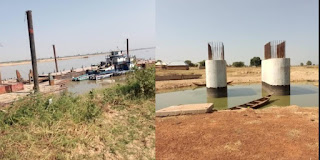Ibi, Taraba State — Construction on the ₦57 billion Ibi River Bridge project in Taraba State has come to a complete standstill, raising concerns over transparency and accountability in the use of public funds. Despite the federal government’s disbursement of over ₦4.7 billion to the contractor, RCC Nigeria Ltd, there is little to show on the ground.
The bridge, which was awarded in 2020 under the Federal Government’s Sukuk bond initiative, was designed to connect Taraba to neighboring Bauchi, Nasarawa, and Plateau states. It was expected to significantly ease transportation, boost commerce, and improve access to healthcare and education for residents of Ibi Local Government Area—many of whom still rely on unsafe wooden canoes to cross the river.
However, a recent visit by socio-accountability platform MonitNG revealed an abandoned site, with no workers present and only minimal construction, such as a few piers, partial sand-filling, and idle barges. Locals say the site has been left vulnerable to looting, with building materials reportedly being carted away.
Disbursement records from govspend.ng indicate that RCC Nigeria Ltd has received several payments totaling ₦4,736,566,998.86 between 2021 and 2024. These include an initial ₦2 billion followed by payments on September 17, 2021 (₦313.3 million), October 11, 2021 (₦179 million), and multiple disbursements in March 2024.
Despite these payments, the project has not progressed for over a year.
Speaking to reporters, the Tafidan Ibi, a local traditional leader, expressed deep disappointment. “The people believed their suffering was ending after over 40 years of waiting. But now, they feel abandoned once again,” he lamented.
Officials at the Federal Ministry of Works in Jalingo confirmed that RCC had submitted a ₦4 billion payment certificate still pending approval. However, they acknowledged that the company had already received substantial funds and provided no explanation for the halted work.
The abandonment of the Ibi River Bridge raises pressing questions about project oversight, accountability, and the fate of critical infrastructure initiatives in underserved regions.





0 Comments